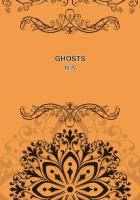(2.ii.54) Let us suppose that the command of the labourer over the articles of hisconsumption remains unaltered. Those who do not subsist by the wages of labour, live either upon the produceof stock, or upon the rent of land. In the case supposed, the tendency is, to impoverish those wholive upon the produce of stock; but to increase the rent of land. With the exception of the ownersof land, all the rest of the community would be either labourers, or capitalists almost equallypoor. As often as land were offered to sale, a great amount of capital would of course be givenfor it; nobody, therefore, would be able to buy more than a very limited portion.
(2.ii.55) In this state of things, sales of land would either be frequent, or they would be rare.
It is necessary to consider what would be the effects in either case.
(2.ii.56) The effects which would arise in the case in which the sales of land would be rare,are ******. The owners of land would be a comparatively small number of rich people, in the midstof a population, all equally, and hopelessly, poor. That there is scarcely any state of society lessconducive to human happiness, we need not here spend any time to prove.
(2.ii.57) If sales went on, it being the nature of land, as of other property, to change handscontinually, the whole land would be divided, at last, into very small portions; covered by adense population, no portion of whom would be in circumstances much better than those of thelabourer. Is this, in itself, a desirable state of things? Is it either followed or preceded by adesirable state of things?
(2.ii.58) When any of those accidents occur by which the annual produce is for one year, or afew years, reduced considerably below the usual standard, in a country in which a considerableproportion of the people have better incomes than those who live upon wages, considerablesavings may be made from their expenditure, to mitigate the effects of the deficiency. In acountry in which all were reduced to the state of wages, any considerable diminution of the usualsupply would diffuse general, irremediable calamity.
(2.ii.59) All the blessings, which flow from that grand and distinguishing attribute of ournature, its progressiveness, the power of advancing continually from one degree of knowledge, onedegree of command over the means of happiness, to another, seem, in a great measure, to dependupon the existence of a class of men who have their time at their command; that is, who are richenough to be freed from all solicitude with respect to the means of living in a certain state ofenjoyment. It is by this class of men that knowledge is cultivated and enlarged; it is also by thisclass that it is diffused; it is this class of men whose children receive the best education, and areprepared for all the higher and more delicate functions of society, as legislators, judges,administrators teachers, inventors in all the arts, and superintendents in all the more importantworks, by which the dominion of the human species is extended over the powers of nature.
(2.ii.60) It is also, in a peculiar manner, the business of those whose object it is to ascertainthe means of raising human happiness to its greatest height, to consider, what is that class of men bywhom the greatest happiness is enjoyed. It will not probably be disputed, that they who areraised above solicitude for the means of subsistence and respectability, without being exposed tothe vices and follies of great riches, the men of middling fortunes, in short, the men to whomsociety is generally indebted for its greatest improvements, are the men, who, having their timeat their own disposal, freed from the necessity of manual labour, subject to no man's authority,and engaged in the most delightful occupations, obtain, as a class, the greatest sum of humanenjoyment. For the happiness, therefore, as well as the ornament of our nature, it is peculiarlydesirable that a class of this description should form as large a proportion of each community aspossible. For this purpose it is absolutely necessary that population should not, by a forcedaccumulation of capital, be made to go on, till the return to capital from the land is very small.
To enable a considerable portion of the community to enjoy the advantages of leisure, the returnto capital must evidently be large. There is a certain density of population which is convenient,both for social intercourse, and for that combination of powers by which the produce of labour isincreased. When these advantages, however, are attained, there seems little reason to wish thatpopulation should proceed any further. If it does proceed further, instead of increasing the netrevenue derived from *the land and labour of the country, or that portion of the annual Producewhich exceeds what is necessary for replacing the capital consumed, and maintaining thelabourers, it lessens that important fund, on the largeness of which the happiness of society to agreat degree depends.















